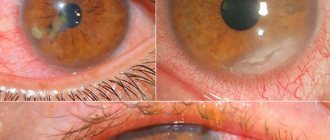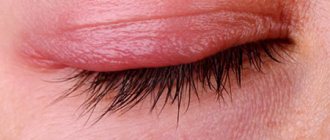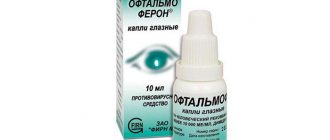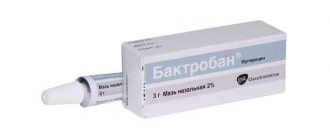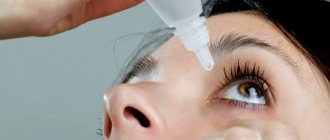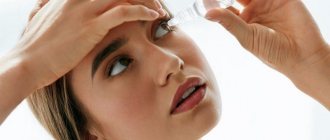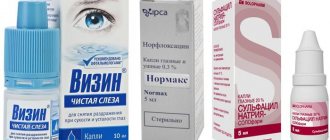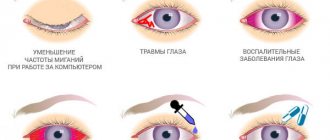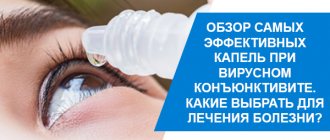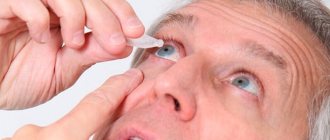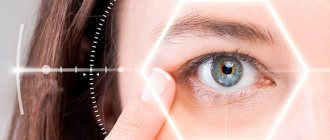Dry eye syndrome: what is it?
Dry eye syndrome (or keratoconjunctivitis sicca) is a pathology caused by insufficient hydration of the cornea and conjunctiva with tear fluid. Dry eyes occur for 2 main reasons:
- insufficient production of tear fluid;
- increased evaporation of tears from the surface of the eye due to a violation of its composition or with rare blinking movements.
At the initial stage of the disease, the main complaints of patients are:
- discomfort in the eyes, burning;
- feeling of a foreign body in the eye;
- redness of the eyes, especially in the evening;
- Watery eyes often develop in the wind or in a room with air conditioning. Lacrimation is reflexive in nature.
If dry eye syndrome is not treated, the process becomes more severe. In this case, microcracks first appear on the cornea, and then damage to the deeper layers occurs. Subsequently, corneal erosions, punctate keratopathies, a scar or an eyesore may form, and visual acuity is significantly reduced.
Causes of dry eyes in pregnant women
During pregnancy, the cause of dry eye syndrome is the instability of the tear film, which occurs due to changes in its composition and physicochemical properties. Changes in the composition of tears occur under the influence of hormones.
On a note! The frequency of appearance of clinical signs of the disease does not depend on the duration of pregnancy. Dry eyes can occur at any time.
Not all pregnant women develop dry eyes. As a rule, for the appearance of symptoms, the action of predisposing factors is necessary, which include:
- use of contact lenses;
- spending a long time behind a computer or phone screen;
- vitamin deficiency;
- dysfunction of the eyelids, for example, with paresis of the facial nerve;
- the presence of diseases accompanied by reduced production of tear fluid;
- if you have previously had surgery on the cornea;
- taking medications that affect the composition and production of tears;
- smoking.
Indications for taking drops during pregnancy
It is obvious that the use of eye drops is advisable for a wide variety of disorders and ailments.
The main indications for the use of eye drops for pregnant women:
- Dry eye syndrome. The development of this disorder is associated with hormonal changes that occur in the female body after fertilization of the egg and during the further development of the fetus. The main symptom is a feeling of dryness, which is accompanied by the sensation of a foreign body under the eyelids. With this syndrome, it is not recommended to use contact lenses. Moisturizing eye drops are used for treatment.
- Edema. The occurrence of swelling in the eye area is associated with a delay in the removal of fluid from the body. This causes an increase in the amount of blood. As a rule, swelling disappears on its own after childbirth, but during pregnancy it can seriously bother the expectant mother.
- Redness of the eyes. Red eyes are a fairly common phenomenon, which, like swelling, is provoked by an increase in the volume of blood circulating in the female body during pregnancy. In this condition, the small capillaries that are located in the eyeball burst due to increased pressure.
- Ingress of household chemicals and foreign bodies. With such disorders, patients experience severe tearing, as well as a burning sensation, and possible short-term visual impairment. In this case, the use of antiseptic eye drops is the most optimal method of treatment.
- Eye stye. This disease is associated with inflammatory processes that occur in the area of the hair follicles that are located under the eyelashes. With this disease, the edge of the eyelid swells greatly, which is associated with inflammation, as well as the accumulation of pus. Treatment with drops allows you to produce a disinfecting effect and speed up the process of tumor resorption.
- Cataract. With pathology, clouding occurs
Often during pregnancy there is a need to use eye dropsthe eye lens, as a result of which vision is severely impaired and the ability to recognize colors is reduced. This in turn leads to various difficulties in carrying out daily activities. Treatment of the disease is carried out through surgery. Various drops are used during the rehabilitation period to restore the functions of the visual analyzer.
There is a wide range of indications that may be associated with ophthalmic diseases.
Treatment of dry eye during pregnancy
Treatment of dry eye syndrome during pregnancy is carried out using moisturizing drops. Drops for dry eyes during pregnancy are divided into the following groups:
- low viscosity drugs;
- preparations of medium viscosity;
- with a high viscosity coefficient.
In the initial stages of the disease, it is preferable to use low-viscosity drugs. These include preparations of natural or artificial tears, Defislez, Slezin, Hilo-komod, Oksial, Optiv. The frequency of instillation is up to 5 times a day, depending on the severity of pathological changes.
For moderate to severe dry eyes, medications of medium or high viscosity are used, usually in gel form. The gel form of drug release allows for prolonged action. Such drugs include Oftagel, Systane, Vidisik, Oftolik. The frequency of instillation is determined individually depending on the pathological manifestations of the eyes.
If dry eyes occur while wearing contact lenses, then during treatment you should stop using them and switch to glasses.
For moderate to severe severity of the disease, it is possible to use antibacterial drugs approved for use during pregnancy.
Surgical treatment of dry eye disease during pregnancy is performed in cases where conservative treatment does not help and there is a high risk of complications, for example, perforation of a corneal ulcer. But if possible, they try to avoid surgery during pregnancy.
Prevention of dry eyes in expectant mothers
Prevention of the development of dry eye syndrome during pregnancy comes down to eliminating predisposing factors, namely:
- It is better to use glasses during pregnancy;
- if a woman continues to wear lenses, then it is necessary to follow the regime for using and storing lenses;
- reduce the amount of time spent behind the monitor screen;
- take vitamins;
- humidify the air in the room;
- to refuse from bad habits;
- treat extragenital diseases;
- spend more time walking in the fresh air;
- Healthy food.
Yulia Chernova, ophthalmologist, especially for Mirmam.pro
When you can't do without medication
Drops during pregnancy are prescribed only when they are really necessary - the drugs are not used for preventive purposes, since they are all toxic, and a pregnant woman does not need unnecessary exposure.
Even when applied topically, some of the drugs still enter the bloodstream and penetrate the placenta, which nourishes the fetus.
The other side of the coin is that any infection in the body of a pregnant woman is not safe for the developing baby, so it is necessary to treat it.
Even the most insignificant at first glance chronic inflammation can cause harm to the fetus.
Indications for therapy during pregnancy:
- Dry eye syndrome – This occurs frequently, especially if you wear contact lenses. With constant hormonal changes, the syndrome often worsens; the feeling of sand in the eyes causes severe discomfort. Drops and avoiding contact lenses will help solve the problem. During pregnancy, it would be better to switch to glasses.
- Edema - most often appears in the third trimester, since the volume of blood in the body will almost double and blood pressure rises. After childbirth, everything will return to its place, but in the meantime, you can alleviate the condition by using appropriate medications.
- Vascular ruptures, red eyes - the cause of these phenomena lies in the changes occurring in the body of a pregnant woman. Consult a cardiologist or ophthalmologist, start using medications that will improve the condition of the vision system.
- Barley, blepharitis - these pathologies develop as a result of infection in the hair follicle. Symptoms are pain, burning, redness, lacrimation, swelling. A compaction with purulent contents appears in the lesion. In appearance, barley looks like a small grain - hence the name of the disease. Spontaneous breakthroughs are possible, so control the situation, remove purulent discharge, if it flows out, disinfect the mucous membranes of the eyes.
- Glaucoma, cataracts, and other eye pathologies - they often worsen during pregnancy and cause severe discomfort to the woman. In this case, the main thing is not to do anything on your own - consult a doctor so that he can adjust the treatment regimen taking into account your condition.
Safe drops for pregnant women
Treatment of ophthalmological disorders is a rather complex process that must be carried out in full accordance with the recommendations of a specialist. Only a doctor can determine which eye drops are appropriate during pregnancy based on information about the disease and taking into account the individual characteristics of each patient.
Unfortunately, the number of drugs that pregnant women are allowed to take is small. Because of this, many experts recommend not using eye drops at all to prevent potential harm to the child.
It is important to remember that different drugs differ from each other not only in composition, but also in indications, contraindications for use, as well as possible side effects.
Main groups of drugs:
- Moisturizing. Drops, whose action is aimed at moisturizing the mucous membrane of the eye, are usually made using purified liquids, which is why they are called “artificial tears.” Performing similar functions, moisturizers eliminate the feeling of dryness and foreign body, while forming a tear film. Among the most common drugs: Oftagel, Vidisik, Systane-ultra.
- Antibacterial. Drugs from this group are used to treat diseases caused by the influence of bacteria, viral microorganisms or fungi on the mucous membrane of the eye. They are characterized by a disinfecting effect, and therefore are used for barley, blepharitis, and keratitis. The most common drugs from this group approved for pregnant women are Vitabact and Okomistin.
- Anti-inflammatory. Action
Eye drops for a pregnant woman are prescribed only by a specialistAnti-inflammatory eye drops are due to the content of steroids and hormones in them, which prevent the inflammatory process from spreading. Such drugs are characterized by high penetrating ability, which is why they are contraindicated for use by pregnant women, especially in the early stages.
- Anti-allergenic. The action of allergy drops is aimed at reducing the sensitivity of eye receptors, thereby reducing tear production and eliminating the burning sensation. These drugs include Lecrolin and Ketatifen, which are approved for use during pregnancy, but are contraindicated during breastfeeding.
- Drops for intraocular pressure. Such drugs help improve the outflow of intraocular fluid, thereby reducing swelling and eliminating redness of the eyes. Such drugs are not recommended for pregnant women due to the content of substances that have a stimulating effect on the parasympathetic nervous system. With the permission of a specialist, if the potential benefit from taking it is significantly greater than the harm, Travatan, Glauprost, or Pilocarpine drops may be prescribed during pregnancy.
In general, there are different groups of eye drops that differ in their principle of action, indications and composition.
The question of what eye drops are possible during pregnancy is very relevant, since most women face various disorders during this period.
Treatment with eye drops should only be done under the supervision of a specialist, observing the exact dosage of the drug.
Watch the educational video:
Read: Ginipral: instructions for use and special instructions
19 Jul 2021 Yuki 699
Share this post
We recommend reading along with this article
- Children's vitamins in eye drops
- Nasal drops for pregnant women: how to choose a safe remedy for…
- Throat spray for children up to one year: assortment
- How to treat yellow snot in a child: effective methods of therapy
- Intracranial pressure in a child: how to check if there is...
- Homeopathic nasal drops for children - proven and effective
- Leakage of amniotic fluid in the first and second half...
- How to treat stye on a child’s eye: medicines and folk recipes
- How to make a children's room with a unique and inimitable design
Discussion: there is 1 comment
- Virginia:
02/17/2020 at 05:20A pregnant girl has severe spring allergies, which causes her eyes to itch and water. Tell me, what eye drops can be used so as not to harm the fetus?
Answer
